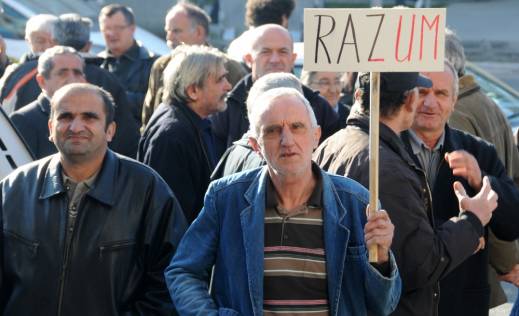17/2/2017 ON THE OCCASION OF PROTEST OF MOTHERS WITH THREE OR MORE CHILDREN DUE TO REDUCTION OF A LIFETIME BENEFIT
20/02/201722/2/2017 BEGINNING OF THE TRIAL TUFIK SOFTIĆ AGAINST THE STATE FOR DAMAGE COMPENSATION
22/02/201721/2/2017 SETTLEMENT BEFORE THE EUROPEAN COURT OF HUMAN RIGHTS IN THE CASE OF FIVE WORKERS OF “RADOJE DAKIĆ”: GOVERNMENT SHOULD CORRECT INJUSTICE TOWARDS ALL WORKERS WHOSE HUMAN RIGHTS WERE VIOLATED IN THE SAME WAY
 Following the settlement before the European Court of Human Rights (ECtHR) with the first five workers of “Radoje Dakić” AD Podgorica (decision Šćepović and others v. Montenegro, 14561/08), the Government of Montenegro should without further delay arrange to pay debts to also other workers of the same company, whose rights to a fair trial and peaceful enjoyment of property the state violated in the same way, by failing to execute court decisions in their favour in the past decade. Such an epilogue is required by fundamental principles of fairness and the rule of law. Unfortunately, irreparable damage has already been done to more than 400 workers who died in the meantime, without being able to realise their rights granted by the courts.
Following the settlement before the European Court of Human Rights (ECtHR) with the first five workers of “Radoje Dakić” AD Podgorica (decision Šćepović and others v. Montenegro, 14561/08), the Government of Montenegro should without further delay arrange to pay debts to also other workers of the same company, whose rights to a fair trial and peaceful enjoyment of property the state violated in the same way, by failing to execute court decisions in their favour in the past decade. Such an epilogue is required by fundamental principles of fairness and the rule of law. Unfortunately, irreparable damage has already been done to more than 400 workers who died in the meantime, without being able to realise their rights granted by the courts.
Human Rights Action (HRA) recalls that ECtHR already in 2013 ruled on the same principle in favour of Borislav Mijanović, finding the State responsible for payment of debts of the company “Radoje Dakić” AD, of which it is a majority owner (Mijanović v. Montenegro, 19580/06). In this case, Montenegro was represented before ECtHR by now Deputy Prime Minister and Minister of Justice Mr. Zoran Pažin.
On the basis of the case-law of the ECtHR regarding Serbia and other countries, HRA already in 2011 urged the Government to take over all debts to workers of all companies in which the state had been the majority owner, and specifically workers of “Radoje Dakić” AD Podgorica, whose right to unpaid salaries had been determined by final and enforceable judgment already in June 2006 and who had ever since been awaiting its execution (see “Human Rights in Montenegro 2010-2011”, HRA, p. 41 and 362: https://www.hraction.org/wp-content/uploads/Human_Rights_in_Montenegro_2010-2011.pdf).
BACKGROUND
“Radoje Dakić” from Podgorica used to be a machine factory, which was transformed from a socially-owned plant into a joint stock company (AD) with majority state ownership, which had about 1,122 workers.
On 28 July 2004, the general meeting of the company stockholders adopted the 2003 Annual Business Report and Final Account, stating that the company owned all the workers a total of 22,618,385.00€ for wages not paid for the period from 1 January 1997 until 30 June 2003. Accordingly, the workers proceed by filing a number of civil lawsuits against the company with the Podgorica Basic Court. In all those civil lawsuits Basic Court issued a judgment in favor of injured workers AD “Radoje Dakić”, which have become final and enforceable in June 2006. The total number of creditors is around 1800 because in addition to workers, the company was sued also by the pensioners and workers whose employment previously terminated.
The enforcement proceedings were initiated with the Podgorica Basic Court pursuant the final decisions, but attempts to enforce them by seizure of the debtor’s monetary assets and later the sale of its property ended in failure.
In order to secure execution of the final judgment, emphasising the responsibility of the state as the majority owner, the workers addressed almost all relevant state institutions: Ombudsman, Prime Minister of Montenegro, President of Montenegro, international organisations. They had been organising protest assemblies on a monthly basis for years.
In response to the inquiry by the Ombudsman on how the problems of “Radoje Dakić” AD Podgorica could be resolved, the Montenegrin Prime Minister on 3 June 2009 sent an official memo stating that the Government was under “no obligation to spend the tax-payers’ money, the use of which is precisely planned, to settle the company’s debts to its creditors”.
In view of the foregoing, the first five “Radoje Dakić” workers on 5 March 2010 filed an application with ECtHR claiming that the failure of the Montenegrin state authorities to enforce the final judgment of 13 April 2007, when the decision to sell the company real estate was taken, violated their right to peaceful enjoyment of possessions enshrined in Article 1 Protocol No. 1 as well as the right to a fair trial from Article 6 para. 1 of the European Convention on Human Rights (ECHR).
In September 2013, ECtHR issued the above-mentioned judgment in Mijanović case, which affirmed the responsibility of the State for failure to execute a judgment against the company “Radoje Dakić”. The ECtHR found a violation of the right to a fair trial (Art. 6, para. 1 of the ECHR) and the right to peaceful enjoyment of property (Art. 1 of Protocol 1 ECHR) and stated: “… given the finding of State liability for the debt owed to the applicant in the present case, it is noted that the State cannot cite either the lack of its own funds or the indigence of the debtor as an excuse for the non-enforcement in question… “.
In Mijanović case, as in previous cases against Serbia adjudicated according to the same principle (Kačapor and Others v. Serbia, 2008; Ilić and Others v. Serbia, 2007; Kostić and Others v. Serbia, 2008; Marčić and Others v. Serbia, 2007), and in the first case against Montenegro (Bijelić v. Montenegro and Serbia, 2009) the ECtHR found that the state violates the right to a fair trial and peaceful enjoyment of property if it does not use all available legal means to enforce final court decisions when the debtor is a private person, while the immediate form of violation of the right to a fair trial exists when the State is a debtor, as in the case of workers of the company “Radoje Dakić” AD, because it is the debtor company’s majority owner.







 English
English